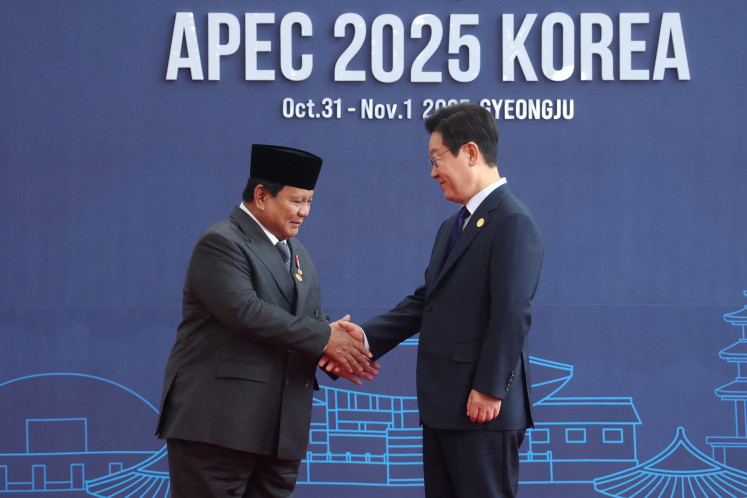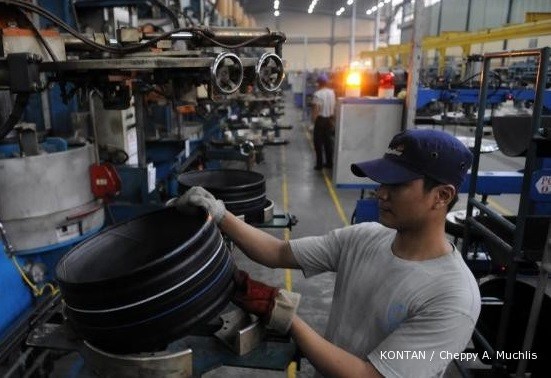Popular Reads
Top Results
Can't find what you're looking for?
View all search resultsPopular Reads
Top Results
Can't find what you're looking for?
View all search resultsBrace yourselves, cross-border e-wallet is coming
JP/Wendra AjistyatamaIndonesia is getting more familiar with cashless payment, at least in urban areas
Change text size
Gift Premium Articles
to Anyone
JP/Wendra Ajistyatama
Indonesia is getting more familiar with cashless payment, at least in urban areas. Through e-wallet applications such as GoPay, Ovo and Dana, many transactions can be performed simply by scanning a Quick Response (QR) code with a mobile phone. A cash-back option is offered by these companies to encourage customers to use the applications. Indonesia has entered a new stage of financial inclusion.
Two popular companies from China, Alipay and WeChat Pay, have entered the market in Indonesia. Last year these two fintech firms went viral when national media reported that they could be used by Chinese tourists in Bali. This could have meant lost income for Indonesia as the transactions between tourists and merchants did not involve Indonesian institutions. To prevent loss, the government issued several regulations to anticipate the cross-border payment risks.
Generally, the government does not prohibit foreign e-wallet companies such as Alipay or WeChat Pay from issuing electronic money or operating in Indonesia. On the contrary, the government welcomes them as long as they adhere to Indonesian laws and fulfill certain requirements. The first requirement is that the foreign e-wallet companies cooperate with Indonesian banks categorized as BUKU 4 (banks whose core capital is at least Rp 30 trillion, about US$2.06 billion) and keep a floating fund of at least 30 percent of the total electronic money value issued by the e-wallet companies in those banks as stipulated by Bank Indonesia (BI) Regulation No. 20/2018 on electronic money (Electronic Money Regulation).
In this case, companies like Alipay and WeChat Pay are the issuers of electronic money, while the banks are the acquirers responsible for settling payments to merchants. This provision is expected to anticipate shadow banking risks which occur when nonbank institutions provide services similar to conventional banks (e.g., lending and money transfers) but lie outside normal banking regulations.
Second, foreign e-wallet companies must use payment channels connected to the national payment gateway. According to the BI Regulation No. 19/2017 on the National Payment Gateway (NPG), the NPG is a system consisting of standards, switching and services built through a set of regulations and mechanisms to integrate instruments and payment channels on the national scale. As the definition suggests, the NPG will integrate various instruments and channels into a single national system.
Third, the Electronic Money Regulation also requires cross-border e-wallet issuers to use the rupiah in each transaction in Indonesia, as also mandated by Law No. 7/2011 concerning the Indonesian currency and BI Regulation No. 17/2015 on the mandatory use of rupiah in Indonesian territory.
The last requirement is that foreign e-wallet companies must implement the Quick Response Code Indonesian Standard (QRIS) as stipulated in Board of Governors Regulation No. 21/2019 on the implementation of Quick Response Code Indonesian Standard for Payment (QRIS Regulation). The standard was established to ensure the efficiency and effectiveness of QR code payments because of the increasing number of payment-system service providers in Indonesia. It is mandatory for every transaction facilitated with a QR code in Indonesia to comply with the QRIS Regulation.
Allowing cross-border e-wallet issuers such as Alipay or WeChat pay to operate in Indonesia is not a bad thing. From a tourist perspective for example, China has been the second-largest source of visitors to Indonesia for the past few years according to Statistics Indonesia. Transactions will be easier and more comfortable for Chinese tourists when they can use their favorite e-wallet applications in Indonesia.
Local e-wallets such as GoPay, Ovo and Dana should not be worried because, like Chinese tourists, Indonesian people will likely prefer e-wallet applications that are familiar to them. At the time of writing, national media outlets are reporting that Alipay and WeChat Pay have coordinated with large Indonesian banks and are in the process of applying for a BI license. The anticipated date of completion is early 2020. When the requirements have been fulfilled and the licenses granted, Alipay and WeChat Pay will be available in Indonesia.
Finally, e-wallet payments and cashless transactions have been part of our daily activities. In fact, the QR code payment is predicted to be the primary method of payment in the future considering the improvement of internet access and financial inclusion. Therefore, although cross-border e-wallet transactions cannot be avoided, they must be controlled. Partnership between foreign e-wallet companies and local payment-system service providers is one example of what must be encouraged. Otherwise, Indonesia will simply be the location of the transactions, without reaping their full benefits.










